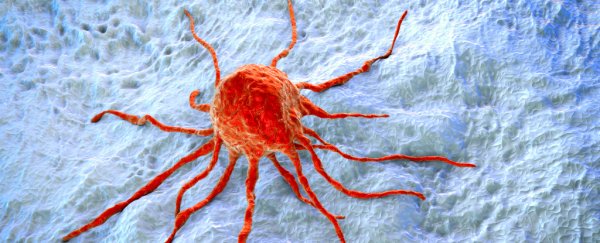In what's being billed as the world's largest collective study on the genetics of breast cancer, researchers have discovered 72 new gene variants that appear to be responsible for increasing the risk of developing the disease.
The additions nearly double the number of genetic markers known to scientists, providing a trove of data for future studies to investigate in search of better understanding, new detection methods, and potentially more effective treatments.
More than 300 research groups were involved in the analysis, which pooled the genetic data of over 275,000 women from all around the globe.
By comparing the genes of those diagnosed with the condition with those who had no history of breast cancer, the researchers were able to identify 65 variations of genes that contributed to the disease's development.
A further seven genes were identified specifically in association with breast cancers that lacked oestrogen receptors, which don't tend to respond to hormone based therapies.
"This work helps us to understand why some women are more at risk of developing breast cancer than others and what genetic markers we should be looking for in order to assess that risk," says researcher Georgia Chenevix-Trench from the QIMR Berghofer Medical Research Institute in Australia.
As with most cancers, the difference between cooperative tissues and rogue cells going into business for themselves can come down to a few mutated genes.
Recent research shows the specific number of genes needed for particular tissues to turn into tumours can vary, ranging from as few as just one to around ten.
Two genes already commonly associated with breast cancer are BRCA1 and BRCA2.
Mutations in these genes prevent them from repairing changes in other sections of DNA in breast tissue, raising the risk of further mutation.
Possessing a broken version of either of these genes is thought to account for as much as 10 percent of all breast cancers, and about 15 percent of ovarian cancers.
That figure skyrockets to as high as quarter of all inherited forms of the disease.
While the discovery of the two BRCA genes and their variants has revolutionised early diagnosis of the disease, they are far from the only genes in the game.
"We know that breast cancer is caused by complex interactions between these genetic variants and our environment, but these newly discovered markers bring the number of known variants associated with breast cancer to around 180," says Chenevix-Trench.
"Our hope is that in future we will be able to test for these genetic variants in order to inform preventative approaches and treatment for women who may be at a higher risk of breast cancer."
About one in eight women in countries such as the US are expected to develop invasive breast cancer in their lifetime.
Early detection and aggressive treatments have seen a decline in deaths from the disease, with survival rates now at around 90 percent after five years.
Yet breast cancer is still one of the most deadly forms of cancer for many women in the US, coming second only to lung cancer for some demographic groups.
Being able to screen and map all of the variations that give rise to the disease could help evaluate risks among a larger number of people, helping them to establish practices that might lead to a quicker diagnosis.
"Many women are offered mammogram screening when they are middle-aged, but if we know a woman has genetic markers that place her at higher risk of breast cancer, we can recommend more intensive screening at a younger age," says Chenevix-Trench.
One day it might even set the stage for personalised treatments.
Knowing now which tumours would respond to hormone-based drugs such as tamoxifen, for example, helps select the right regime of drugs for chemotherapy.
We still have a long way to go in developing a deeper understanding of how changes in certain genes work together to create a cancerous cell.
Having an extensive wanted list is the first important step to sniffing out those rogues and interrogating them.
